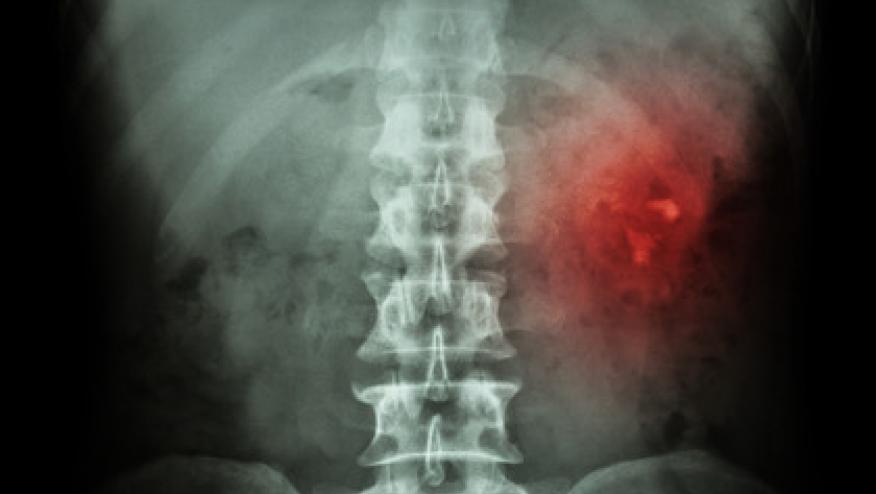Renal Impairment in Rheumatoid Arthritis Save

Patients with highly active rheumatoid arthritis (RA) experienced faster declines in kidney function than those whose disease was under better control, analysis of a large registry indicated.
Compared with RA patients in clinical remission, rates of decline in estimated glomerular filtration rate (eGFR) over an average of 4.7 years of follow-up were greater by 0.09 to 0.18 mL/min/1.73 m2 annually among those with progressively greater disease activity (all P<0.05), reported Sho Fukui, MD, MPH, of Brigham and Women's Hospital in Boston, and colleagues.
Risk of developing stage 3b chronic kidney disease (CKD) was nearly doubled in patients with high disease activity relative to those in remission, according to the group's report in Annals of the Rheumatic Diseases.
But remission did not protect against increasing kidney impairment. Far from it: these individuals faced a mean annual eGFR decline of 0.83 mL/min/1.73 m2, the researchers found.
"This study suggests that controlling disease activity may potentially contribute to preserving kidney function in patients with RA," Fukui and colleagues wrote. "Further studies regarding the effect of different DMARDs [disease-modifying anti-rheumatic drugs] on kidney function should be conducted to evaluate the potential of treatment strategies for kidney function preservation in patients with RA."
That RA patients are at special risk for renal impairment and CKD isn't new. But how the progressive decline in kidney function tracks with RA activity hasn't been well studied, the researchers noted. Onset of CKD is a particular problem for RA patients because it complicates use of standard drugs such as methotrexate and ibuprofen. Moreover, CKD increases the already heightened risk for cardiovascular events in RA patients.
To compare development of renal impairment with RA disease activity, Fukui's group turned to the so-called CorEvitas RA registry, which currently houses data on some 60,000 patients under treatment at more than 1,000 practices. The present study focused on 31,129 participants with at least two clinic visits from 2001 to 2022, and whose records included at least two serum creatinine measurements and a Clinical Disease Activity Index (CDAI) assessment at enrollment. Primary analyses were further restricted to patients with baseline eGFR values of at least 60 mL/min/1.73 m2.
Included participants were a median of 58 years old at baseline and three-quarters were women. Median eGFR was 90.7 mL/min/1.73 m2. The data included a total of 146,778 person-years of follow-up. At enrollment, 22% of the cohort was in clinical remission (CDAI ≤2.8), about one-third had low disease activity (CDAI 2.8-10), just over one-quarter had moderate activity (CDAI 10-22), and the remainder had highly active RA (CDAI >22). In this latter group, the median CDAI value was 31.0 (IQR 26.0-39.2). Most patients in every disease activity category were taking methotrexate and/or other conventional DMARDs, and half were on a targeted biologic drug as well.
Averages for the incremental annual decline in eGFR, on top of that seen for patients in remission, were as follows for the three categories of active disease:
- Low: 0.09 (95% CI 0.03-0.15) mL/min/1.73 m2
- Moderate: 0.17 (95% CI 0.10-0.23) mL/min/1.73 m2
- High: 0.18 (95% CI 0.08-0.27) mL/min/1.73 m2
Fukui and colleagues also looked at the likelihood of developing two grades of CKD: 3a, in which eGFR falls below 60 mL/min/1.73 m2, and 3b, defined as eGFR below 45 mL/min/1.73 m2, both for periods of at least 3 months. They calculated the following hazard ratios for these outcomes, with the remission group as reference:
- Low: 3a, 1.15 (95% CI 1.01-1.30); 3b, 1.22 (95% CI 0.84-1.76)
- Moderate: 3a, 1.22 (95% CI 1.06-1.40); 3b, 1.66 (95% CI 1.12-2.45)
- High: 3a, 1.27 (95% CI 1.05-1.52); 3b, 1.93 (95% CI 1.16-3.20)
Whether drug therapies can affect these trajectories is unclear, which is why the researchers called for studies to examine the question specifically. In general, they observed, "DMARD treatment improves systemic vascular inflammation ... and potentially has a protective effect on nephrosclerosis." On the other hand, even patients in remission faced substantial progression in renal impairment. As well, treatment regimens were similar across disease activity categories among patients in the current study, suggesting that therapy must be successful in reducing RA activity in order to lower risk for developing CKD.
Limitations to the study included lack of detail on patients' use of non-steroidal anti-inflammatory drugs and on severity of comorbidities such as hypertension and diabetes.
Source Reference: Fukui S, et al "Disease activity of rheumatoid arthritis and kidney function decline: A large prospective registry study" Ann Rheum Dis 2024; DOI: 10.1136/ard-2024-226156.










If you are a health practitioner, you may Login/Register to comment.
Due to the nature of these comment forums, only health practitioners are allowed to comment at this time.